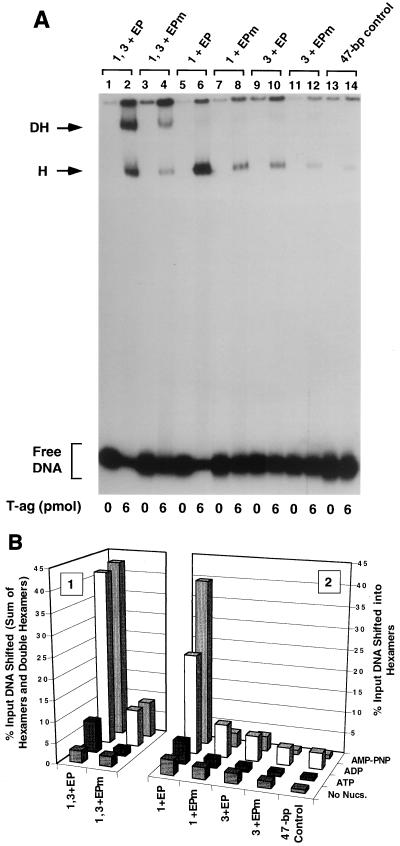FIG. 3.
Representative gel mobility shift assay used to establish which components of the 48-bp penta 1, 3 + EP assembly unit are required for hexamer and double-hexamer formation. (A) Reactions were conducted in the presence of AMP-PNP with 6 pmol of T-ag and 25 fmol of the indicated oligonucleotide. As a positive control, one reaction was conducted with the 48-bp penta 1, 3 + EP oligonucleotide (lane 2). To test the role of the EP in these assembly events, a reaction was conducted with the 48-bp penta 1, 3 + EPm oligonucleotide (lane 4). Reactions conducted with the single pentanucleotide containing 48-bp penta 1 + EP and 48-bp penta 1 + EPm oligonucleotides are presented in lanes 6 and 8, respectively. Similar reactions, conducted with the 48-bp penta 3 + EP and 48-bp penta 3 + EPm oligonucleotides, are presented in lanes 10 and 12. To assay for non-sequence-specific binding events, a reaction was conducted with the 47-bp control oligonucleotide (lane 14). The reactions in the odd-numbered lanes were conducted in the absence of protein. The positions of T-ag hexamers (H) and double hexamers (DH) are indicated by arrows. The location of input or free DNA is indicated by a bracket. (B) The reactions in Fig. 3A and similar reactions conducted in the presence of ADP, ATP, and no exogenous nucleotides (data not shown) were quantitated with a Molecular Dynamics Phosphor- Imager. The percentage of input DNA, containing single pentanucleotides, that was shifted into hexamers is presented in histogram 2. The nucleotide cofactor used in a given set of reactions is shown to the right of the figure, and the names of the individual oligonucleotides are presented along the x axis, while the percentage of input DNA present in the hexamer species is listed on the y axis. Histogram 1 indicates the quantitative impact of mutating the EP region on T-ag oligomerization into hexamers and double hexamers.

